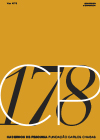Women and care: disputes and negotiations in academic space
Keywords:
Work, University, Gender Relations, WomenAbstract
This article offers both empirical and theoretical resources that demonstrate how the link between space and gender operates in academic life in social sciences and humanities in Bogotá, Colombia. By examining ten life stories of women who work in different universities, we affirm that academia is a hostile space for the women who inhabit it, as it reproduces dualist, colonial, hetero-patriarchal and capitalist logics within it; these particularly affect the experiences of women and non-heteronormative bodies. Care is found to be a central and conflictive notion in this experience of academia, as it operates both as a form of oppression, by nullifying women’s participation and visibility, and as a form of resistance, negotiation and political power to transform the university.
Downloads
References
BLÁZQUEZ, Norma; FLÓRES, Fátima; RÍOS, Maribel (coord.). Investigación feminista: epistemología, metodología y representaciones sociales. México D.F.: UNAM, 2012.
BORDO, Susan. El feminismo, la cultura occidental y el cuerpo. Revista de Estudios de Género La Ventana, v. 14, p. 44-65, 2001.
CARNEIRO, Sueli. Escritos de uma vida. São Paulo: Pólen Livros, 2019.
CARNEIRO, Sueli. Mulheres em movimento. Estudos Avançados, São Paulo, v. 17, n. 49, p. 117-133, 2003.
CORDEIRO, Marina. O tempo desigualmente distribuído: gênero e carreira acadêmica entre cientistas sociais. 2015. Disponible en: http://abet2017.com.br/wp-content/uploads/2015/09/Paper-ABET-2015-Marina-Cordeiro.pdf. Acceso el: 18 sept. 2020. CURIEL, Ochy. Género, raza, sexualidad: debates contemporáneos. 2014. Disponible en: https://www.urosario.edu.co/ Subsitio/Catedra-de-Estudios-Afrocolombianos/Documentos/13-Ochy-Curiel---Genero-raza-y-sexualidad-Debates-.pdf. Acceso el: 17 sept. 2020.
ELLIS, Carolyn; BOCHNER, Arthur P. Autoethnography, personal narrative, reflexivity. In: NORMAN, Denzin; LINCOLN, Yvonna (ed.). Handbook of qualitative research. Thousand Oaks: Sage, 2000.
FONSECA, Inara; GUZZO, Morgani. Feminismos y herida colonial: una propuesta para el rescate de los cuerpos secuestrados en Brasil. Tabula Rasa, v. 29, p. 65-84, 2018.
GÓMEZ, Vanessa. Itinerario de una sensibilidad política. Bogotá: Universidad de los Andes, 2010.
GONZALEZ, Lélia. Por um feminismo afro-latino-americano. Revista Isis Internacional, n. 8, 1998.
HARAWAY, Donna. Ciencia, cyborgs y mujeres: la reivindicación de la naturaleza. Valencia: Cátedra, 1995. (Feminismos).
HARDING, Sandra. Ciencia y feminismo. Madrid: Morata, 1996.
KARSTEN, Lia; MEERTENS, Donny, D. La geografía del género: sobre visibilidad, identidad y relaciones de poder. Documentos de Análisis Geografico, v. 19-20, p. 181-193, 1992.
KISS, Diana; BARRIOS, Olga; ÁLVAREZ, Judith. Inequidad y diferencia: mujeres y desarrollo académico. Estudos Feministas, v. 15, n. 1, p. 85-105, 2007.
LAMUS, Doris. Mujeres negras/afrocolombianas en los procesos organizativos en Colombia: un informe al estado del debate. Reflexión Política, v. 11, n. 21, p. 108-125, 2009.
LUGONES, María. Hacia un feminismo decolonial. Hypatia, Cali, v. 25, n. 4, p. 105-117, 2010.
MASSEY, Doreen. A global sense of place. Marxism Today, p. 24-29, 1991.
MASSEY, Doreen. Learning from Latin America, Soundings, n. 50, p. 131-141, 2012.
MCDOWELL, Linda. Género, identidad y lugar: un estudio de las geografías feministas. Madrid: Cátedra, 2000.
OLIVEIRA, Rodrigo de. Maternidade no currículo: projeto de pesquisadoras estima impacto das atividades como mãe na carreira científica. Revista Pesquisa FAPESP, jul. 2018, 269. ed. Atualizado em 27 ago 2018. Disponible en: https://revistapesquisa.fapesp.br/maternidade-no-curriculo/. Acceso el: 18 sept. 2020.
PERLONGHER, Néstor. Prosa plebeya: ensayos 1980-1992. Buenos Aires: Colihue, 1996.
PLUMWOOD, Val. Feminism and the mastery of nature. Londres: Routledge, 1993.
PUYANA, Yolanda; BARRETO, Juanita. La historia de vida: recurso en la investigación cualitativa. Maguaré, Bogotá, n. 10, p. 185-196, 1994. Disponible en: http://www.bdigital.unal.edu.co/18451/2/14265-48104-1-PB.pdf. Acceso el: 12 mayo 2019.
QUIJANO, Anibal. Colonialidad del poder, globalización y democracia. Revista de Ciencias Sociales de la Universidad Autónoma de Nuevo León, Monterrey, Nuevo León, n. 7 y 8, p. 58-90, 2002.
RANADE, Shilpa. The way she moves: mapping the everyday production of gender-space. Economical and Political Weekly, Mumbai, v. 42, n. 17, p. 1519-1526, 2007.
RESTREPO, Eduardo. Descolonizar la Universidad. In: BARBOSA; Jorge Luis; PEREIRA, Lewis (comp.) Investigación cualitativa emergente: reflexiones y casos. Sincelejo: Cecar, 2018. p. 11-26.
RIBEIRO, Djamila. O que é lugar de fala. Belo Horizonte: Letramento, 2017.
RICOEUR, Paul. Del texto a la acción: ensayos de hermenéutica II. México D.F.: Fondo de Cultura Económica, 2002.
RÍOS, Nicolás; MANDIOLA, Marcela; VARAS, Alejandro. Haciendo género, haciendo academia: un análisis feminista de la organización del trabajo académico en Chile. Psicoperspectivas, v. 16, n. 2, p. 114-124, 2017.
RUBIN, Gayle. Tráfico de mujeres: notas sobre la economía política del sexo. Revista Nueva Antropología, México, v. 8, n. 30, p. 95-145, 1986.
SAUL, Jennifer. Implicit bias and philosophy. London: Oxford University Press, 2016.
SEGATO, Rita. La guerra contra las mujeres. Madrid: Traficantes de Sueños, 2016.
SOUSA, Boaventura de. Descolonizar el saber, reinventar el poder. Uruguay: Trilce, 2010.
VIVEROS, Mara. La interseccionalidad: una aproximación situada a la dominación. Debate Feminista, n. 52, p. 1-17, oct. 2016.
Downloads
Published
How to Cite
Issue
Section
License
Copyright (c) 2020 Cadernos de Pesquisa

This work is licensed under a Creative Commons Attribution-NonCommercial 4.0 International License.
Authors who publish in this journal agree to the following terms:
a. Authors retain the copyright and grant the journal the right to first publication, with the paper simultaneously licensed under the Creative Commons Attribution license that allows the sharing of the paper with acknowledgment of authorship and initial publication in this journal.
b. Authors are authorized to assume additional contracts separately, for non-exclusive distribution of the version of the paper published in this journal (for example publishing in institutional repository or as a book chapter), with acknowledgment of authorship and initial publication in this journal.
c. Authors are allowed and encouraged to publish and distribute their paper on-line (for example in institutional repositories or on their personal page) at any moment before or during the editorial process, as this can generate productive changes, as well as increase the impact and citation of the published paper (See The Effect of Open Access).









